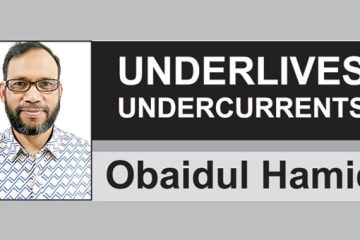Sadeq Khan
By classical military definition, the winner in a battle is the army that remains on the battlefield when the battle is over. The Hamas leadership in the Gaza strip still stands, suffering and resisting over three weeks of savage attacks, carnage and ruination by the mighty Israeli war machine.
Israeli writer and peace activist Uri Anvery commented in Counterpunch, January 19 issue: “The planners of the war (in Gaza) chose the timing with care: during the holidays, when everybody was on vacation, and while President Bush was still around. But they somehow forgot to take into consideration a fateful date: next Tuesday (January 20) Barack Obama will enter the White House.
Brazen indulgence
Tel Aviv was shamelessly indulged by the departed Bush administration of USA (and leading European nations), and allegedly obtained active connivance of the anti-people President of the Palestinian entity, Mahmud Abbas, as well as passive toleration by Egypt, Saudi Arabia, UAE and Jordan, all of whom wished for the demise of Hamas. But Hamas survived, and the rabid Israeli army withdrew from Gaza ahead of inauguration of Barack Obama as the President of the United States.
This date is now casting a huge shadow on events. The Israeli Barak understands that if the American Barack gets angry, that would mean disaster. Conclusion: the horrors of Gaza must stop before the inauguration. This week that determined all political and military decisions. Not ‘the number of rockets’, not ‘victory’, not ‘breaking Hamas’.
When there is a ceasefire, the first question will be: Who won? “Israeli army was not eager to enter the Palestinian towns, in which (Hamas) fighters were entrenched. And indeed: the army told the government that the conquest of Gaza city could cost the lives of about 200 soldiers, and no politician was ready for that on the eve of elections.
The very fact that a guerrilla force of a few thousand lightly armed fighters held out for long weeks against one of the world’s mightiest armies with enormous firepower, will look to millions of Palestinians and other Arabs and Muslims, and not only to them, like an unqualified victory.
Arab defeat in 1948
“The Arab defeat in the 1948 war brought in its wake the fall of almost all the existing Arab regimes and the ascent of a new generation of nationalist leaders, exemplified by Gamal Abd-al-Nasser. The 2009 war may bring about the fall of the current crop of Arab regimes and the ascent of a new generation of leaders – Islamic fundamentalists who hate Israel and all the west.”
Kissinger thesis
The ‘Obama effect’, the label coined for the mandate for change by the US electorate in the international media, may have its repercussions in the geopolitics involving Bangladesh as well. Obama is committed to upholding the right of U.S. might and the role of US supremacy despite declining economic power of USA in the world market. On that score, his policy planning team has taken note of the Kissinger thesis that the world economic order may overcome the current crisis and stabilise only through Sino-American cooperation. Formerly U.S. National Security Adviser and Secretary of State, Henry Kissinger predicts US Asia-Pacific cooperation with China to overtake US Trans-Atlantic cooperation with Europe.
Remodeling US ties
President Obama is also committed to repair and remodelling of US relations with the Arab and Islamic countries. That includes remodelling of US relations comprehensively with Bangladesh polity as well. The US perception of Bangladesh as a “moderate Muslim country” with democratic credentials and not insignifant voice in the OIC, and as potentially capable with its abundant cheap labour to attract sovereign Arab funds for investments and joint ventures, continues to weigh with the Obama team.
Obama has identified Iran-Afghanistan-Pakistan-Kashmir-India as a problem zone with informal war brewing and nuclear teeth grunting in uneven contests, the sobering effects of economic successes and failures of various players notwithstanding. The Obama team advocates engagement in the area both in military and conciliatory terms.
ASEAN Plus Three
ASEAN Plus Three extending up to Nepal and Bangladesh present a different picture. The internal dynamics of this populous belt register an accommodating capacity capable of burying militant tendencies and resolving conflicts. The manpower potential and alternative development outlook in this zone are also significant. Per-force the Obama team will have to engage with the nations of this zone creatively, and in a collective approach if not individually with each nation-state.
In Bangladesh, the pattern of governance and the practices of democracy came particularly under censorious scrutiny of the Trans-Atlantic power bloc led by U.S.A from the time of the Bush administration’s declaration of global war on terror and expedition against Teleban rule in Afghanistan.
BNP-Jamat partnership
That external scrutiny enrolled the services of a civil society movement for good governance and liberal democracy, which in effect helped the then Opposition in its tirades against the ruling alliance primarily of BNP-Jamat partnership.
A tumultuous electioneering of nearly four years, the latter half of which was initially adverse to both sides of the political divide vying for power, climaxed in the end in consolidation of the grand alliance under the leadership of Sheikh Hasina and fragmentation of BNP by three significant choppings (one by sacking of Badruddoza Chowdhury, one by rebellion of Oli Ahmed and group, and one by expulsion of Mannan Bhuiyan), leaving the towering leadership of Begum Khaleda Zia unquestioned, but cornered nonetheless under emergency straitjacket.
Khaleda’s four-party alliance won only just over 10 per cent of seats in the National Assembly in the general election after emergency was withdrawn. BNP lost some 8 per cent of votes to the Awami League. But her four-party alliance still stands with the solid support of 35 per cent of voters. Her strategic mistakes and the follies of her team that contributed to the debacle is not our subject of deliberation here; but of course she may learn from her mistakes and follies and stage a challenging comeback. The Obama effect may also offer her a window of opportunity for a challenging comeback, if she may play her cards well.
Indo-US nuke deal
The BNP team-members are continuing to harp on the theme that the Trans-Atlantic power bloc, particularly after the Bush administration, put its heart on the Indo-American nuclear deal and conceded to Delhi a hegemonic role in South Asian affairs, consorted with Delhi for a regime change in Bangladesh, and her electoral defeat is the result of that compact. In so far as there may be merit in that allegation, it also points to her party’s failure to foresee the geopolitical flux, engage the geopolitical players, and effectively neutralise at least partially most components of that compact while it was in the making. This blame game also blinds the eyes of Khaleda Zia’s team to necessary self-criticism and correction in regard to its relations with the internal organs of that state that were summarily put on the dock (instead of rival contenders for power) by BNP-Jamat leaders during the December hustings.
Geo-political players
The “Obama effect” may offer the BNP-Jamat leadership of four-party alliance a fresh opening to engage with major geo-political players politically and without rancour. Economically too, Sino-American understanding may help the existing OIC and Arab connections of the four-party alliance a solid role to play in Bangladesh, albeit without getting involved in domestic political bids and counter-bids.
The new foreign minister of current Sheikh Hasina cabinet, Dr. Dipu Moni appears well-aware of economic diplomacy she must undertake to develop OIC and Arab connections both for roping in sovereign fund investments as well as expanding manpower export market. A common strategy between the government and the opposition on the matter may be most desirable for the good of the nation.
Meanwhile, post-election violence, particularly amongst the students following of Sheikh Hasina, may be posing a disturbing distraction for Sheikh Hasina’s young team from the onerous tasks ahead. Indeed the fragmentation syndrome that badly maulled BNP may now be contaminating Sheikh Hasina’s intimate team. Indian correspondent Srabanti Majumder writing in weekly Blitz of India noted in a report captioned “Bangladesh, Untold story of Sheikh Hasina’s arrest” as follows:
The RATS and Hasina
“Almost 15 days prior to arrest of Awami League chief Sheikh Hasina, a number of leading leaders of the party named Abdur Razzak, Amir Hossain Amu, Tofail Ahmed, Suranjit Sengupta, Sajeda Chowdhury — known as the RATS — along with an internationally known lawyer met some of the senior military officials at a house in Dhaka’s Gulshan area to discuss the possible reform in the party. During this meeting, eminent Awami League leader Amir Hossain Amu opined that, as first step of any such reform, Awami League chief Sheikh Hasina should be immediately arrested. His opinion was strongly supported by two other figures in the military-backed interim government named Barrister Moinul Hussein and Major General [Retired] M Abdul Matin.
The masterminds
“Dr. Debopriya Bhattacharya (Bangladesh envoy to the U.N. in Geneva) was also amongst the masterminds in seeing total reform in both the large political parties in the country….. Former dictator Hussain Muhammed Ershad was actively helping the interim government through various ways. When a government in the Middle East stopped recruiting Bangladeshi workers, Ershad visited that country being an unofficial envoy of the millitary backed interim government and succeeded in removing the ban. Hussain Muhammed Ershad was personally eager to see both the female leaders ousted from the leadership of their respective parties.
Prime Minister Sheikh Hasina is already aware of the total conspiracy and the role of the conspirators in sending her in prison thus pushing the fate of her party into extreme difficulty.
“This was the prime reason for the exclusion of Abdur Razzak, Amir Hossain Amu, Tofail Ahmed and Suranjit Sengupta – together they are known as RATS – with some other senior leaders including Sajeda Chowdhury in the cabinet, (and exclusion of H M Ershad as well?)……”
The AL circles tend to believe that the RATS were the prime movers of party reforms [popularly known as “Minus Two Theory” with the help of a powerful security agency] who attempted to implement it with others help. They also say that before holding the next Awami League central council meeting sometime later this year, the chances of including other suspected minor reformists in the cabinet is almost zero.
“Meanwhile, deprived heavy-weight leaders in Awami League are continuing to conspire in putting pressure on the present government by instigating unlawful activities within Campuses in Bangladesh as well as extortion, land grabbing, murder etc., in the country. It is also learnt that, some angry heavyweight leaders are privately telling their followers to do everything in distorting the law and order situation in the country to greatly discredit the newly formed cabinet of youngsters mostly, in the present government.”
Bangladesh cannot afford any more of such violent distractions. It is high time that cool heads from both the government and the opposition came together to work out a bipartisan strategy for Bangladesh to take advantage of the ‘Obama effect’ for the sake of the nation.
Courtesy: www.weeklyholiday.net







